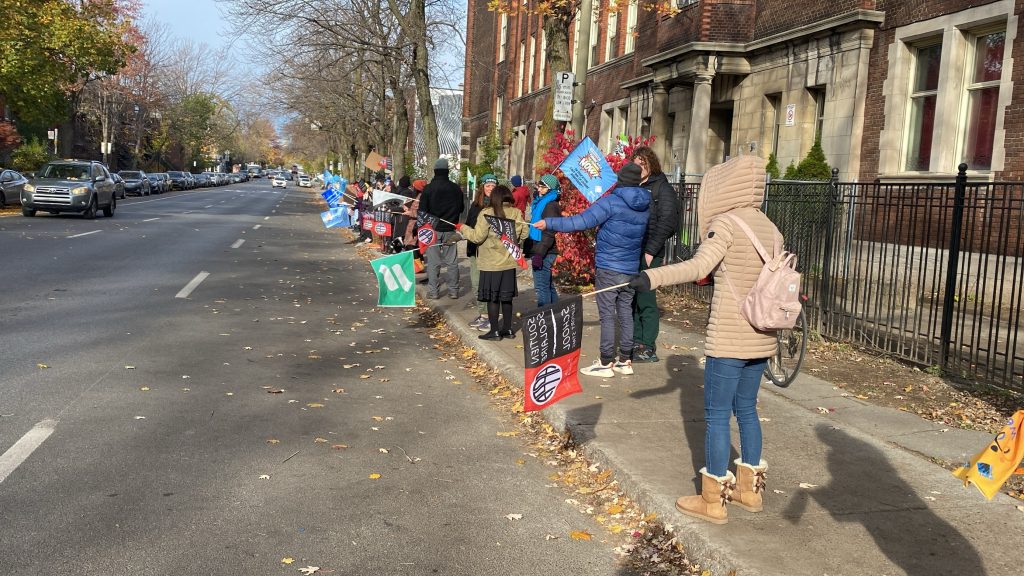Public sector strike: mediator appointed to bargaining table as strike begins this week

Posted November 19, 2023 12:13 pm.
Last Updated November 20, 2023 10:49 am.
A mediator has been appointed to the bargaining table between the Quebec government and the public workers unions – as staff in education, health and social services prepare to go on strike across Quebec this week.
Quebec Labour Minister Jean Boulet announced the appointment on social media Monday morning.
Shortly before, the common front multi-union group had posted on social media saying they had put in a request on Nov. 16, 2023 for mediation at the bargaining table.
“This request is to created real movement by bringing a neutral person at the bargaining table, who will listen to both parties, and give recommendations in order to come to an agreement,” the group said in a Tweet on the X platform.
Quebec’s treasury board president saying they welcomed the news as they want to find resolution as quickly as possible.
On Sunday, Lebel implored unions to table a counter-offer to the government’s last contract proposal.
Sonia LeBel published a short video on X, saying the province’s last offer was a serious one and merited a counter-proposal, but the unions have not submitted a reply.
“There’s been no movement from the union, I have had no counter-offer, they’ve offered nothing in return,” LeBel said. The province’s latest offer is worth $8 billion and is the fourth tabled during negotiations.
The province is negotiating contracts with unions representing some 600,000 public sector workers. Teachers, nurses, health care workers, junior college professors and other public sector employees will be on strike at various times during the coming week.
Unions rejected Quebec’s latest contract offer in late October for all employees — a 10.3-per-cent salary increase over five years and a one-time payment of $1,000 to each worker, up slightly from the nine per cent over the same term offered last December.
The government has said the offer was serious and in line with inflation forecasts, but the unions have described the government’s offer as insulting.
Unions have previously sought a three-year contract with annual increases tied to the inflation rate: two percentage points above inflation in the first year or $100 per week, whichever is more beneficial, followed by three points higher in the second year and four points higher in the third.
LeBel said while no one disagrees that salaries are important, she called on unions to show flexibility, noting that pay increases won’t solve other outstanding issues like overcrowded classrooms or compulsory overtime for nurses.
The unions swung back on Sunday. The Federation interprofessionnelle de la sante du Quebec — which represents 80,000 nurses, licensed practical nurses, respiratory therapists and other health professionals — said the province’s offers were “contemptuous of health care professionals” and irresponsible for the safety of health workers.
“It’s not the number of offers that matters, but what’s in them,” the FIQ union replied on social media ahead of two strike days on Thursday and Friday.
Also this week, members of four major public sector unions representing a “common front” of some 420,000 workers will be off the job between Tuesday and Thursday. That group includes the majority of elementary and high school teachers as well as school support staff and health care workers like orderlies and technicians.
One of the unions in that foursome responded to LeBel’s latest remarks by saying different sectors have made proposals at the bargaining table, adding that’s where the government should focus its efforts.
“We said that if there was no agreement before the 21st (of November), we would be on strike. It is clear that there will be no settlement before then,” said Francois Enault, vice-president of the CSN, one of the four common front unions. “What we are saying is that we are ready to negotiate, seven days a week, we want a settlement.”
“The only thing we agree on with the government is we want a settlement by the holidays,” he added.
Most schools will be closed between Tuesday and Thursday while the FAE union, which represents 65,000 Quebec elementary and high school teachers and is negotiating separately, launches an unlimited general strike on Nov. 23.








